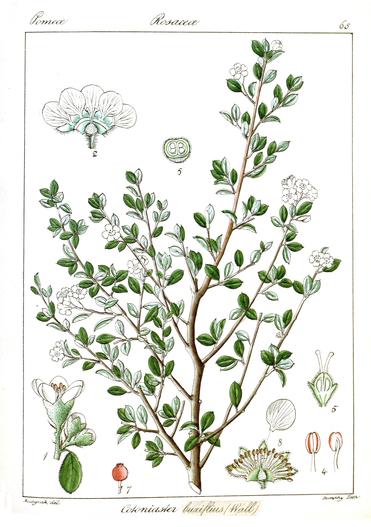Box-Leaf Cotoneaster
(Cotoneaster buxifolius)
Box-Leaf Cotoneaster (Cotoneaster buxifolius)
/
/

art: Rungiah; text: Robert Wight
Public domain
Image By:
art: Rungiah; text: Robert Wight
Recorded By:
Copyright:
Public domain
Copyright Notice:
Photo by: art: Rungiah; text: Robert Wight | License Type: Public domain | License URL: https://creativecommons.org/public-domain/ | Uploader: Shyamal | Publisher: Wikipedia Commons

Estimated Native Range
Summary
Cotoneaster buxifolius, commonly known as Box-Leaf Cotoneaster, is a semi-deciduous shrub native to the mountainous regions of Western China, specifically found in rocky slopes and cliffs at altitudes of 2200 - 3000 meters. It typically grows at a moderate rate to a height and width of 1-3 feet (0.3-0.9 meters). The plant has small, glossy, box-like leaves and produces clusters of white flowers in the spring, which are followed by red berries that persist into winter, adding seasonal interest. The flowers are modest in size but can attract pollinators such as bees.
Box-Leaf Cotoneaster is valued for its compact habit and versatility in the landscape. It is often used for border planting, low hedges, and ground cover, particularly in rock gardens and slopes where its root system can help control erosion. It is adaptable to a range of soil types, including clay, loam, and sandy soils, provided they have medium drainage. While it prefers full sun or part shade, it is relatively low maintenance and can tolerate drought once established. Gardeners should be aware that Cotoneaster species can be invasive in some regions and should be planted with caution outside their native range.CC BY-SA 4.0
Box-Leaf Cotoneaster is valued for its compact habit and versatility in the landscape. It is often used for border planting, low hedges, and ground cover, particularly in rock gardens and slopes where its root system can help control erosion. It is adaptable to a range of soil types, including clay, loam, and sandy soils, provided they have medium drainage. While it prefers full sun or part shade, it is relatively low maintenance and can tolerate drought once established. Gardeners should be aware that Cotoneaster species can be invasive in some regions and should be planted with caution outside their native range.CC BY-SA 4.0
Plant Description
- Plant Type: Shrub
- Height: 1-3 feet
- Width: 1-3 feet
- Growth Rate: Moderate
- Flower Color: White
- Flowering Season: Spring
- Leaf Retention: Semi-deciduous
Growth Requirements
- Sun: Full Sun, Part Shade
- Water: Medium
- Drainage: Medium
Common Uses
Border Plant, Groundcover, Hedges, Low Maintenance, Rock Garden
Natural Habitat
Native to mountainous regions of Western China, specifically rocky slopes and cliffs at altitudes of 2200 - 3000 meters
Other Names
Common Names: Huang Yang Ye Xun Zi , Box-leaved Cotoneaster
Scientific Names: Cotoneaster buxifolius , Cotoneaster affinis , Cotoneaster argenteus , Cotoneaster buxifolius , Cotoneaster buxifolius var. buxifolius , Cotoneaster buxifolius var. typicus , Cotoneaster conspicuus var. argenteus , Cotoneaster hodjingensis , Cotoneaster hookerianus , Cotoneaster lanata
GBIF Accepted Name: